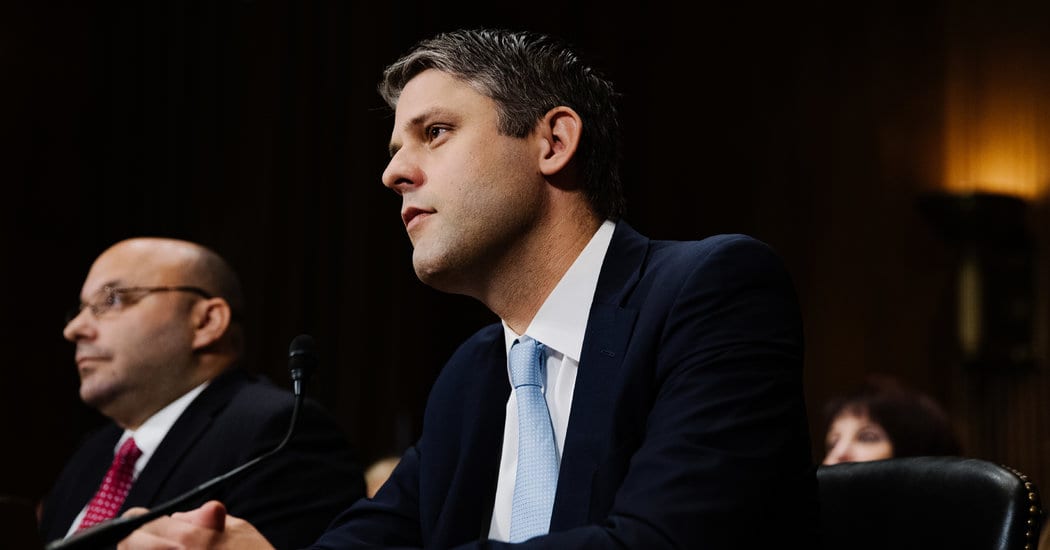[ad_1]
WASHINGTON — In March, after Justice Brett M. Kavanaugh took time off from his Supreme Court duties to swear in Justin Walker to the U.S. District Court for the Western District of Kentucky in Louisville, the newly minted judge recognized how he had gotten there at the age of 37, with zero trial experience but a pedigree in conservatism.
His mother had supported a rising Republican star named Mitch McConnell when her son was just eight, Judge Walker recalled: “I’ve got to hand it to you, mom. It has been extremely important to me that Kentucky’s senior senator is Mitch McConnell.”
Then he turned to Justice Kavanaugh as he addressed the justice’s liberal opponents: “What can I say that I haven’t already said on Fox News?” said Judge Walker, who gave 119 media interviews and several speeches paid for by the Federalist Society rebutting Kavanaugh critics. “In Brett Kavanaugh’s America,” he said, “we will not surrender while you wage war on our work, or our cause, or our hope, or our dream.”
He closed with a broadside against the American Bar Association, which had given him a rare “Not Qualified” rating for his absence of courtroom work, categorizing the professional organization among his “opponents.” “Although we are winning we have not won. Although we celebrate today, we cannot take for granted tomorrow — or we will lose our courts and our country to critics who call us terrifying and who describe us as deplorable.”
Barely two months later, Judge Walker will appear Wednesday before the Senate Judiciary Committee as Mr. McConnell’s handpicked nominee to a new seat: the U.S. Court of Appeals for the District of Columbia Circuit, long seen as the second most powerful court in the land and a potential springboard to the most powerful, the Supreme Court.
In his quest to remake the American judiciary, Mr. McConnell is not done with his protégé, Judge Walker, the grandson of a millionaire Kentucky power broker and a soldier in the Senate majority leader’s judicial push. Calling senators back to Washington amid a pandemic, Mr. McConnell plans a swift confirmation for the youngest nominee to the D.C. appellate court since 1983.
Republicans promote Judge Walker as a “drain the swamp” D.C. outsider, who triumphed over a hardscrabble upbringing in Kentucky to reach the heights of American jurisprudence 11 years out of law school.
“He’s young, brilliant and conservative,” said Mike Davis, who leads the Article III Project, a judicial advocacy group that has pushed President Trump’s appointments to the federal bench.
Democrats see the appointment differently. “I don’t think Mitch cares much about who is appointed to these spots as long as it’s someone he knows and he has confidence will be a conservative,” said Representative John Yarmuth, a Democrat who represents Mr. McConnell’s hometown Louisville and who has known Mr. McConnell for decades.
“It’s the ultimate wielding of power,” he added, “and that’s what Mitch lives for.”
Judge Walker’s biography has received something of a makeover during his judicial ascent. Last year he described his mother, Deborah Walker, as “a single working mom” who “made indescribable sacrifices to provide me, the first in my family to graduate from college, with the opportunities she didn’t have herself.”
But his maternal grandfather, Frank R. Metts, was a millionaire real estate developer and former Kentucky transportation secretary who was one of the state’s most powerful officials in the early 1980s. Judge Walker’s estranged father, Terry Martin Walker, earned his college degree in 1979, several years before he and Judge Walker’s mother divorced in 1985.
“My father believed strongly in his children working to make their own way in the world,” Deborah Walker said in emailed comments.
“When Justin referred to ‘opportunities I didn’t have,’ he was referring to the opportunities a college graduate has,” she said. “I wanted that for him.”
In an interview, Terry Walker declined to comment on his son’s personal narrative.
“He was funny, just so smart and a good kid all the way around,” Mr. Walker said of his son.
“Justin and I had a great, great relationship. But junior or senior year in high school, he kind of got out of wanting to see me,” said Mr. Walker, a real estate appraiser. “His mom was doing a fantastic job raising him. And I loved him so much I had to let him go.”
Judge Walker’s parents were barely into their 20s when they married in 1976. They named Justin, born in 1982, after Justin Hayward, the guitarist and frontman for an often over-the-top British progressive rock band, the Moody Blues, and gave him the same middle name, Reed, as his well-known grandfather. Judge Walker served as ring bearer when his father remarried, and in his younger years was close to the three children his father had with his second wife.
He grew up in a Democratic household. After making millions on land deals, his grandfather became Kentucky transportation secretary in the administration of Gov. John Y. Brown Jr., overseeing thousands of workers and tens of millions of dollars in construction funds.
Despite his Democratic pedigree, young Justin embraced the Republican Party from childhood. “I remember on Halloween once or more than once, his costume was a G.O.P. elephant,” Terry Walker recalled.
A profile in his high school alumni magazine said Judge Walker was “putting up political yard signs at age four or five.” In a 1995 letter to the editor in The Courier-Journal in Louisville, a 13-year-old Justin Walker defended the Christian Coalition.
“You have made a bunch of concerned parents, who feel strongly about their beliefs and who are trying to take back their government from all the Washington bureaucrats, look like a bunch of fanatical, right-winged, anti-Semitic bigots,” he wrote.
Frank R. Metts arranged his grandson’s first meeting with Mr. McConnell while he was a student at Saint Xavier. Judge Walker interviewed Mr. McConnell for a treatise on the Republicans’ 1994 takeover of Congress, a paper that Mr. McConnell hailed as equivalent to “a Ph.D. dissertation” at his protégé’s first judicial confirmation hearing last year.
“He was such a political nerd or junkie, into the Contract with America and Newt Gingrich,” said Michael Denbow, who was class president at Saint Xavier when Judge Walker attended. “It was something the rest of us slackers didn’t even think about.”
In the summer of 2002, while a student at Duke University, Judge Walker interned in Mr. McConnell’s office. After graduating in 2004, he worked on the re-election campaign of President George W. Bush, and then served as a speechwriter for Defense Secretary Donald H. Rumsfeld.
He attended Harvard Law School, joining its chapter of the conservative Federalist Society in 2006. He held leadership roles in the organization until last year, and has kept up his membership from the bench.
Judge Walker clerked for Justice Kavanaugh when he was a judge on the D.C. Circuit Court, and then for Justice Anthony M. Kennedy on the Supreme Court, working for brief periods at the law firm Gibson, Dunn & Crutcher in between. He then moved back to Louisville for a job teaching legal writing at the University of Louisville, a McConnell power center.
While in Louisville, Judge Walker also did work for Javelin, a literary agency founded by former aides to Mr. McConnell and Mr. Rumsfeld. He declined to tell the Senate whose books he had worked on, citing his clients’ expectations of confidentiality. But he was prominently named as “Justin Walker at Javelin” in the acknowledgments of a 2015 book by Senator Mike Lee, Republican of Utah, who sits on the Judiciary Committee considering his nomination this week.
On June 22, 2018, Judge Walker told Mr. McConnell that he was interested in a judgeship, according to his Senate questionnaire. Five days later, he gave his first interview pressing for the Kavanaugh confirmation.
In July of 2018, with Mr. Trump embroiled in the special counsel investigation stemming from his firing of James Comey, the F.B.I. director, Judge Walker wrote a paper arguing that “calls for an independent F.B.I. are misguided and dangerous.”
The F.B.I.’s history of “infringements on liberty,” he wrote, “shows why the F.B.I. must not operate as an independent agency. It must be accountable to the President.”
Two months later, in September of 2018, Judge Walker was interviewed by White House lawyers to replace Justice Kavanaugh on the D.C. Circuit, well before he was being considered for the lower court. He was passed over that time, but in March 2019, he again met with the White House about a potential appointment. He was confirmed along party lines last fall to the trial court in Kentucky, and on Jan. 8, 2020, Mr. McConnell accompanied him to the White House to meet with the president.
At the March swearing-in, Justice Kavanaugh emphasized in his remarks that Justice Elena Kagan, who was named to the high court by President Barack Obama, had recommended Judge Walker as a clerk to Justice Kennedy, while she was dean of the Harvard Law School.
But after taking the oath, Judge Walker delivered a speech that touched nerves after the bitter Kavanaugh fight. “You were like St. Paul,” he said in describing Justice Kavanaugh’s confirmation, “hard pressed on every side but not crushed, perplexed but not in despair, persecuted but not abandoned, struck down but not destroyed.”
Judge Walker cited St. Paul again last month in a decision in favor of the On Fire Christian Church, in Louisville, which had sued Mayor Greg Fischer over his urging faith leaders to avoid large gatherings such as the church’s drive-in Easter services amid the coronavirus pandemic. “On Holy Thursday, an American mayor criminalized the communal celebration of Easter,” Judge Walker wrote.
Manning G. Warren III, Judge Walker’s fellow law professor at the University of Louisville, sent a letter to the Judiciary Committee in support of Judge Walker’s confirmation. But even he said he considered that 16-page opinion over the top. “I don’t think Mayor Fischer would ever criminalize Easter,” Mr. Warren said, laughing. “He’s a good guy.”
Kitty Bennett contributed research.


















